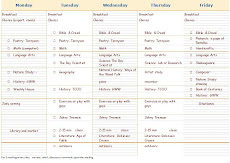 A bit more on Plan B. I mentioned it before as an alternative to getting locked into plans. I wanted to talk about it a bit more because it's perfectly possible that people could read this blog and think that all these forms look incredibly complex and that our daily structure is that way, too.
A bit more on Plan B. I mentioned it before as an alternative to getting locked into plans. I wanted to talk about it a bit more because it's perfectly possible that people could read this blog and think that all these forms look incredibly complex and that our daily structure is that way, too.Voltaire said that "the best is the enemy of the good." Charlotte Mason quoted that.... making the point that we can paralyze or wear ourselves out in a quest for perfection.
I think part of what I think of as "Plan B" is an antidote to this (I almost typed "Plan Be" and maybe that was a subconscious slip).
I think planning can be a good thing. St. Ignatius, in his Spiritual Exercises, structured things very carefully, trying to "scaffold" a retreatant's attempts to make progress in spiritual things. He wasn't trying to replace grace, but to support its workings by providing an order and goals.
But I, personally, have to watch out that my plans don't replace the workings of learning; that what ought to be a scaffold becomes something like an exoskeleton or a stockade, closing us in.
So that's where the "Plan Be" comes in for me -- it is a reality check, the "bottom line" of how I want my family to function. In homeschooling for quite a few years, I have seen that what really WORKED in the long run was the basic habits and traditions in my family. The conversations, the reading, the music, the nature expeditions, the reflections and examens and "family language" type thing that builds bonds (hmm, two more "B's" there)
Whether we got through X math book, or purchased Y curriculum, really mattered a lot less in the big picture than these basic family "Ways".
So when I'm feeling that we are getting either over-stuffed with "too much", too many things flying at us in the way of subjects, activities, plans--- or else that "starved" feeling of envying/feeling wistful about what other homeschools are accomplishing or purchasing.... then I return to those Plan B for "basics, bottom line, being" that help us restore our balance (one more B : )).
The planning does seem to help -- I am one of those who have to engage with something to make it work, and planning is for me a fun way of engaging. But I've managed before without much planning, because that part of it isn't really the essence. The essence is a book, a child, a parent, maybe some paper and a pen. Remembering that helps me use the planning as enrichment, as support, rather than having the planning take over and stand in the way.
It really is a practical coping device, so that's why I'm mentioning it here.
The gif is a basic weekly checklist which I use sometimes when I want to simplify things, and here is the doc Weekly Checklist.



No comments:
Post a Comment